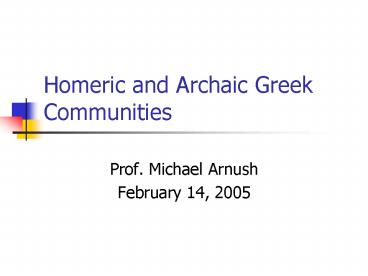Homeric and Archaic Greek Communities - PowerPoint PPT Presentation
1 / 28
Title:
Homeric and Archaic Greek Communities
Description:
Archaic intellectualism: Greek philosophy. world of discovery, inquiry, challenge to authority ... Greek world view: according to Hecataeus, 6th century. 6th ... – PowerPoint PPT presentation
Number of Views:78
Avg rating:3.0/5.0
Title: Homeric and Archaic Greek Communities
1
Homeric and Archaic Greek Communities
- Prof. Michael Arnush
- February 14, 2005
2
Last time
- What constitutes a community in the
- family?
- household (oikos)?
- palace (megaron)?
- world of the elite (aristoi)?
- world of the people (demos)?
- world of the slaves (douloi)?
- world of the other (xenoi)?
3
Herodotus, passage 1
- Blood and language close-knit kinships, same
alphabet, similar dialects, modes of
communication - Religion rituals, worship of the same gods,
festivals, temples - Customs
4
Greek festivals
- Parthenon, 432 BCE
5
Festival processions Panathenaia
- Parthenon, Panathenaic frieze
6
Panathenaia
7
Olympia, Sanctuary of Zeus stadium
8
Delphi, Sanctuary of Apollo temple of Apollo
9
Agon competition
- Pankration
10
Greek values
- arete manliness, virtue
- time honor
- kleos reputation, renown
- avoidance of aidos shame
11
Rhapsodes and performance
12
Delphi, sanctuary of Apollo theater
13
Homer, passage 2
- Agora
- market
- meeting place
- civic and religious space
- court trials with elders as judges
- heralds keeping order
- demos as spectators
- dancing place (orig. threshing floor, later
orchestra?) - fields, vineyards, pasturelands
- basileus as warrior ruler
- proto-polis
14
(Athens) Agora now
15
(Athens) agora then
16
Homer and the oral tradition
- Late Bronze Age 2000-1200
- Trojan War 1186
- Dark Age 1100-750
- Homeric world ca. 800
- Homer 750-725
17
Thucydides, passage 3
- nostoi
- revolutions and factionalism
- migrations
- Dorian invasion
- colonization
18
Homeric culture
- reliance on the sea
- social contracts
- fortified communities
- political relations assemblies, royal councils,
basileus and basileis
19
Archaic Age 750-490
- Land and topography
- Limited arable land
- Crops oil, wine
- Contact with Phoenicians
- Alphabet
- Codification of law
- Land pressures, growing population, interest in
exploration, historie, all led to
20
Colonization
- Acquire arete, time, kleos
- Knowledge of other places
- Consult Delphic oracle
- Send out nobles, landless poor, disenfranchised
politicals, exiles, merchants - Founder oikistes to found an oikos
- Stake out land, temenos
- Reliance on hoplites (hoplon)
- Maintain connection to mother-city
- Places to colonize southern Italy, Sicily, Black
Sea
21
Distribution of colonies
22
The polis the autonomous city-state, ca. 700-323
- Colonization contributed to the sense of
isolation and autonomy - polis autonomous, self-governing, urban (astu)
and rural (chora) - usually fortified with a high point (akropolis)
- identified with the citizens (politai)
- ruled by the aristoi (hence, aristocracy)
23
Archaic intellectualism Greek philosophy
- world of discovery, inquiry, challenge to
authority - development in art, architecture, literature,
mathematics, astronomy, medicine, government - analogy of ships at sea
- philosophia love of wisdom, or devotion to
uncommon knowledge
24
Greek world view according to Hecataeus, 6th
century
25
6th century spiritual movements
- social, intellectual, spiritual stirrings
- dissatisfaction with Hesiods world view and the
Homeric conception of myth - craving for life after death, curiosity about
what happens to the soul - Orphism, Dionysiac worship, mystery cults
(Eleusis), Pythagoreanism
26
6th century intellectual movements
- Ionian thinkers, originating in or near Miletus
- Thales water is everything
- Xenophanes kosmos is everything
- Heraklitos change is everything
- Parmenides being is everything
27
Archaic age
- an age of political development
- an age of intellectual curiosity
- an age of artistic achievement
- an age of kings giving way to aristocrats giving
way to oligarchs giving way to tyrants and
awaiting democracy
28
This week
- Wednesday Aeschylus Agamemnon (Prof. Erika
Nesholm) - Thursday, 5.30pm A Very Liquid Heaven (Prof.
Mary Crone Odekon) - Friday Sophocles Ajax (Prof. Nesholm)































